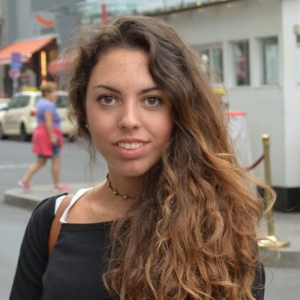Ana_LongBio
 Ana Merino
Ana Merino
ESR 7 – The B cell lineage in ANCA-associated vasculitis: functional characterisation and identification of novel targets
Hello! I am Ana Merino Vico and I come from Madrid, Spain. My inherent curiosity about everything made me have my mind always full of questions that I needed to answer. As I grew up, I always struggled to think of a future job that would cover all my scientific needs and challenges, until I had a very interesting talk about a student of biochemistry during my last year of high school. “We study how the body works in the inside, at molecular and cellular levels, it’s fascinating”. I will never forget those words, words that were so inspiring that made me want to become a Biochemist and pursue my scientific career.
During my BSc in Autonomous University of Madrid, I was most interested in the cellular biology courses, as well as pathology, but particularly Immunology caught my attention. During the summer semester of my 4th BSc year, I made one of decisions of my life, and took a plane to Vienna (Austria) for an ERASMUS+ 6-month stay. My life changed completely personally and professionally. I completely unveiled my passion for living in a foreign country and adapting to a new culture in an international environment, meeting wonderful people. I took courses of the MSc in Biotechnology at the University of Life Sciences and Natural Resources, and I was captivated by a course in Antibodies, where I learned the importance of B cells and the multiple applications of antibodies. I was also introduced in the field of basic Bioinformatics, from which I realized the importance of processing big amounts of data to extract very useful information, which today is essential.
I returned to Madrid and performed my BSc thesis in Dr. Balbino Alarcón’s laboratory (until May 2019), in the Department of Immunology of the Centro de Biología Molecular Severo Ochoa. After having performed two summer internships in the lab, I finally developed the project I had vaguely started: I designed a biosensor-based method for real time detection of the T cell receptor conformational changes, focusing on the delta and epsilon chains of the CD3 polypeptide, whic are crucial for T cell activation. To detect the conformational changes, the Jurkat cell line was transfected with fluorescent CD3-biosensors, and fluorescent resonance energy transfer (FRET) analysis was performed by flow cytometry. My experience provided me with string knowledge on T cells and the molecular pathways that lead to their activation.
After my BSc, I felt that I needed to see how research was performed in another country, so I decided to spend 2 months of an ERASMUS+ Traineeship in the lab of Dr. Roos Vandenbroucke, under the supervision of Dr. Florencia Linero, in the field of Immunology in the Central Nervous System at the IRC-VIB (Ghent, Belgium), where I gained knowledge in the field of phage display and in the development of nanobodies in the area of brain targeting. Once again, being abroad was a very enriching experience for me at all levels, and it was definitely something that I wanted to keep on doing.
It was after my stay in Ghent that I decided to focus my carreer in Immunology, and I enrolled in the MSc in Advanced Immunology at the University of Barcelona, from where I graduated in July 2020. I performed my MSc thesis in Dr. Anna Bigas’ lab, in the Department of Stem Cells and Cancer at the Institut del Mar d’Investigacions Mèdiques (IMIM). My interest in T-cell based immunotherapy and the ontogeny of the immune system made me embark in a very exciting project, generating T lymphocytes from Embryonic Stem Cells through forced expression of lymphoid genes by using a dead Cas9 system during their differentitation. Our work shed light on the use of this cell type as renewable sources of T cells in vitro , the long-term reach being the transplant of autologous tissue-specific progenitors for personalized therapy.
After graduating from my MSc, of all the courses I had taken, Autoimmunity was the only one that I had constantly in my mind, and when looking at PhD offers, I luckily found the ARCAID project, and after reading the proposal of position ‘ESR7 The B cell lineage in ANCA-associated vasculitis: functional characterisation and identification of novel targets’ in Dr. Sander W. Tas laboratory, I could not hesitate to apply. I could not be happier to do research in the lab, studying the complex mechnisms cellular and molecular mechanisms leading to this disease, applying the knowledge I have gained these years and learning as much as possible during my PhD. This translational project will shed light on novel targets to treat the vasculitis, and hopefully help in other autoimmune diseases.
Besides science, I am a very social person and I love to help people! Painting has been very iportant to me since I was a little girl, and since I like everything related to art and culture. I really enjoy being in an international environment and meeting new people and new cultures, including languages and food. I also love sports, reading, movies, music, nature, traveling, and learning. I am sure that my experience during the PhD will change my life, personally and professionally, and I can’t wait to start!